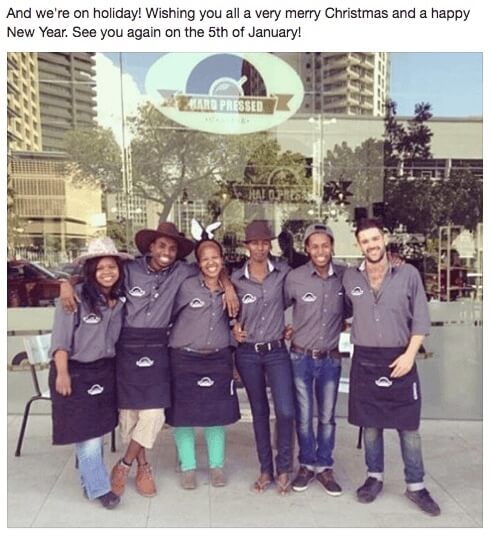When you’re running a small business, every single thing counts – especially motivating your employees. Most of the time, at least in the early days, you might feel like you’re trying to get water out of a rock or spin straw into gold. Money is tight and customer reviews can make or break you.
Because you need to make the most of every available resource and opportunity you can’t afford to have under-performing or demotivated staff.
An inexperienced but motivated person generally gets more done than an experienced but demotivated person.
Adam Duxbury, Founder, Granadilla Swim
The question now is how do you motivate people? More specifically, how do you motivate people when: a) the work they do may be monotonous or not stimulating, and b) you don’t have excess money to use for incentives. Ask yourself the following four questions and you’ll discover new ways to motivate your employees.
How do you want your business to feel?
Start by taking an honest look at what your current company culture is and think about what you would like it to be. Are you going for fun, cheeky and upbeat? Maybe you would rather have a slick and professional culture. Keep in mind that your products, service and overall offering are often a reflection of your company culture.
Take a look at Hard Pressed Cafe – a hub of early morning coffee activities on Cape Town’s Bree Street. The staff spend full days on their feet preparing coffee, food, serving customers and running the till. Despite chaotically busy days they always have high energy, a welcoming smile and a daily joke ready for anyone who comes by. This is because the owner, Yaron, has made ‘not taking life too seriously’ part of his brand and culture.
Anything goes. From Reggae Thursday to Bottomless Coffee Tuesdays.



With a great atmosphere like this, you’ll have a hard time not smiling.
A great company culture will quickly turn bad if your staff don’t have enough direction and training.
Do you set clear expectations?
No one is telepathic (none that we know of at least). If you expect all the shelves in your store to be packed in the next hour – you need to say so. If you say the shelves must be packed before the end of the day, don’t get annoyed if your employee does other work first. You also need to check that the expectations you set are feasible and reasonable. Doing something ‘challenging’ can be motivating, but trying to achieve something completely unrealistic will leave staff feeling exasperated.
That said, although setting clear and realistic expectations is essential, it won’t guarantee your employee is happy or doing their absolute best.
Do you get buy-in from employees and give people ownership?
Getting buy-in from staff is as simple as asking “what do you think about…?” or “if we changed …. do you think it would help?” Making people feel like they have a say and are allowed to voice their opinion to you is important for collaboration.
It may be time-consuming, but it will be beneficial for yourself, your business and your team.
Taking the concept of ‘buy-in’ to the next level means giving staff members ownership over certain things to run as they see fit.
For example, Tamburai, the founder of ONEOFEACH sells her unique handbags at multiple locations. Because she can’t be present to oversee all of them, Tamburai gives her staff ownership of each store location. She tells her staff that they “own” the stall or store when she is not there and they should make decisions and treat it as theirs. This not only makes staff take initiative and think about the bigger picture, it also makes them feel more trusted and valued.
Giving staff free reign and having trust in them is great – as long as they are properly trained and encouraged to keep learning.
Do you take the time to train employees and encourage learning?
There’s a short anecdote of two business partners having a conversation that sums up the importance of employee training very well.
Partner 1 asks partner 2:
What happens if we invest in developing our people and they leave us?
Partner 2 replies:
What happens if we don’t and they stay?
When it comes to training and helping people learn, open communication is critical. Make the effort to ensure your employees are comfortable asking questions and aren’t afraid to look ignorant in front of their colleagues. It’s also important to have conversations around what they would like to learn more about. You never know what skills you might uncover in your people. your barista might secretly want to be a bartender and your chef might have a knack for interior decor.
Adam, the founder of Granadilla told us the story of how his domestic worker, Hannah Njikho, was cleaning the office when the phone rang. She answered it and managed to assist the person. Over time she started taking on more and more of the office tasks until she became one of their full-time staff members.
Hannah’s new role involves online order fulfilment, customer relations and logistics. Adam says Hannah had a very good manager who was determined to help empower her and give her more responsibility. It’s this sort of progress that will motivate people to keep trying and doing their best.
Should you be worried about having your best employees leave? If they become too good they may be poached by other companies or they might start their own business – and that’s OK. In fact, it might even be great.

Luke from Culture Club Cheese helped his barista, Gcobani, pursue his passion for coffee. Today Gcobani runs his own business – Barista Cup. He sells coffee and roasts his own coffee beans. His locally made coffee is taking off and his former employer now purchases the unique blend to use in his cafe- and the customers love it. This is the type of rewarding partnership that comes from helping people grow.


